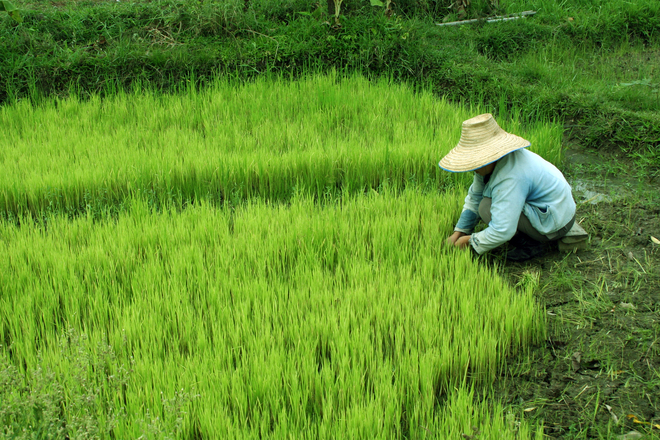The Better Rice Initiative Asia or BRIA Project, initiated under the German Federal Ministry for Economic Cooperation and Development (BMZ), aims to promote regional food security, sustainable rice production, better market linkages and enhanced nutritional status in Thailand, Indonesia, Viet Nam and the Philippines.
In Thailand, the BRIA project is implemented in collaboration with the Rice Department of the Ministry of Agriculture and Cooperatives (MoAC), the main national public partner, and the private sector including Bayer. BRIA has the overall goal to improve the livelihoods of rural rice farmers through the promotion of sustainable production and improved market access. Interventions are aimed at enabling smallholder farmers to increase their income through “better rice” production in an ecologically sustainable manner and to strengthen the farmers’ position within the rice value chain in coordination with public-private partners. The process starts with the training and capacity increase of “smart famers” from each selected CRC (Community Rice Centre). The ongoing training activities aim to cover 200 CRCs in the northeastern region of Thailand. Other partners include the Department of Agricultural Extension (DoAE), BASF, Olam, Deutsche Bank, the International Rice Research Institute (IRRI) of the Philippines.
There are two BRIA components in Indonesia, namely agriculture and nutrition. The agriculture component aims to increase farmers´ knowledge and competencies in rice cultivation to produce higher quantities (yield) and better quality (value) leading to enhanced farmers’ incomes and food security. The whole component will cover 7,500 lead farmers, who will reach out to 10 more rice farmers. The overall objective of the nutrition component is to enhance the nutritional status of poor population groups in Indonesia.
BRIA Viet Nam is implementing a Public-Private Partnership (PPP) pilot model in rice production in the provinces of Dong Thap, Hau Giang and Kien Giang in Mekong Delta. BRIA intends to promote the implementation of the Agricultural Restructuring Plan to improve farmers’ livelihoods in those provinces, promote sustainable development of ecologically resilient rice production systems, enhance market linkages and quality of rice.
In the Philippines, BRIA aims to improve incomes of smallholder farmers, rice yields and the competitiveness of the rice production. Its interventions include support of the agricultural extension system, improving market linkages and facilitating policy dialogue. BRIA activities are implemented in 13 municipalities in the three provinces of Iloilo, Southern Leyte and Aurora. Both public and private sectors have participated in and have contributed to the BRIA project on national, regional and municipal levels.
To promote sustainability in rice farming, BRIA has, recently, introduced the Sustainable Rice Platform (SRP) Standard for Sustainable Rice Cultivation. According to SRP, the SRP Standard represents the world’s first initiative that promotes environmentally sustainable and socially responsible rice production management. It uses environmental and socio-economic benchmarks to maintain yields for rice smallholders, reduce the environmental footprint of rice cultivation and meet consumer needs for food safety and quality. The Standard consists of 46 requirements covering productivity, food safety, worker health, labour rights and biodiversity. SRP is a global multi-stakeholder alliance co-convened by UNEP (the United Nations Environment Programme) and IRRI, with public and private sector stakeholders, research, financial institutions and non-profits. SRP aims to help rice farmers produce more efficiently, enhance their livelihoods, and keep the environment healthy.
BRIA has supported the development and adoption of the SRP Standard in the four BRIA pilot countries by conducting pilot studies as part of the SRP’s multi-country field validation programme to assess the applicability, relevance and acceptability of the Standard to BRIA farmers. The results of the pilot studies in this year will be collected and provided as feedback to SRP in order to improve the Standard and refine the assurance system. BRIA works hand in hand with local authorities and private partners in these interventions. It is now clear that the SRP Standard and its Performance Indicators offer useful objective measurement tools to monitor on-farm practices of rice farmers, and assess their progress towards sustainability.
BRIA Thailand and BRIA Indonesia have been actively taking part in the SRP pilot testing. In Thailand, the pilot testing covers an assessment of the applicability of the standard, farmer training, establishment of an IMS (Internal Management System), and a group assurance system. Thai Rice Department (RD), BRIA and Olam have together initiated pilot testing of the SRP Standard with farmer groups in Ubon Ratchathani Province. Bayer has joined in this endeavour. RD, Olam, Bayer are among the 55 SRP members. The pilot testing of the standard in Thailand is also considered as one of BRIA’s interventions to improve market access for resource-poor rice farmers in this area.
In Indonesia, BRIA is conducting a farmer survey to assess compliance of BRIA farmers to the SRP Standard. The result of the pilot testing will later serve as the basis for further assessment by the Ministry of Agriculture on the adoption of the SRP standard in Indonesia.
